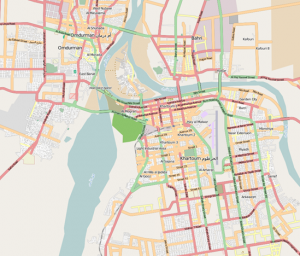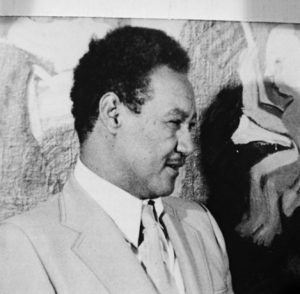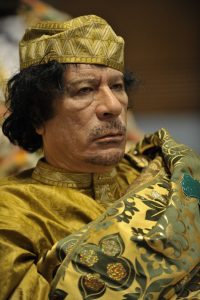36 Giddafi takes Khartoum
Kaddafi takes Khartoum
It was the 4th of July 1976 nearing the end of my second year on the Geography Faculty at the University of Khartoum. I was part of a group of 60 faculty and students returning from the Sixth Cataract (water fall) on the Nile after studying a variety of environmental conditions that included the physical geography of desert land-forms, plants and animals. Irrigation agriculture along the banks of Nile and rain fed agriculture in the semi-arid lands.
We were heading south to the University of Khartoum back from the annual field course exercises in the desert. It was over 100 degrees Fahrenheit. The road followed the eastern bank of the Nile and the Eastern Sahara was on our left. As the buses bounced along the aging tarmac road the students were singing traditional songs in Arabic. I began to notice that most of the traffic was moving north, away from Khartoum. Our progress was unimpeded as there were few vehicles competing for our southbound lane.
At one point we stopped to drop off a few students at their homes along the way. Some of the villagers mentioned that there was no radio communication from Khartoum.

Lower Nile, April 17, 2005. Photo by Mark Dingemanse. Released under the Creative Commons Attribution 2.5 license. https://commons.wikimedia.org/wiki/File:Nubia_today.png
“The radio is dead” exclaimed one person as the bus stopped. “There is trouble in Khartoum!”
Wanting to know what was happening we checked our radio in the bus. All stations were off the air which was an ominous sign. Usually this is the first thing that happens when there is a coup d’état as the insurgents immediately close off communications to keep any resistance from organizing again them.

Location map Sudan Khartoum.png by Maps for free, adapted by Dr. Blofeld is licensed under CC BY-SA 2.0, 2020. .
We became concerned as we approached Khartoum and stopped frequently to ask questions from the locals. A driver coming from Khartoum stopped his pickup truck and told us there was a strange military group of foreigners that had suddenly taken over the city.
I had experienced two other coup attempts in 1974 and in 1975. Similar communication black outs had occurred then. Both of these attempts failed and Jaffar Numeri continued reigning as president.
We felt some uncertainty about continuing on to the University. Our bus driver began waving down on- coming vehicles to ask what they knew about this new development. One driver informed us. “The insurgents had only taken Khartoum and had not crossed theNiles.”
I could relax somewhat, since my home was across the Blue Nile from Khartoum. Khartoum is located where the White and Blue Niles meet. In fact the name Khartoum in a local tribal language means “elephant’s trunk” and, indeed, on the map I could see the slight resemblance to a long trunk reaching between where the rivers meet. When the English came they constructed Khartoum, between the two Niles.
 President Nimeiri. Photo by van Soedan, kop, _Bestanddeelnr_931-5438 “e:Gaafar Nimeiry Gaafar Mimery 1981.jpg” by Unknown author is licensed under CC BY-SA 3.0 Released under the Creative Commons Attribution 2.5 License. We then knew we could not return to Khartoum but must remain in the district north of the Blue Nile, called Khartoum North. We dropped the students off at the School of Agriculture and Veterinary campus at Shambat, Khartoum North and since I lived just a stone’s throw north of the Blue Nile the other lecturers came to stay at my place. Fortunately, my wife Mary, and the twins had gone back to the States for the summer and would not need to be inconvenienced by the sudden visitors.
President Nimeiri. Photo by van Soedan, kop, _Bestanddeelnr_931-5438 “e:Gaafar Nimeiry Gaafar Mimery 1981.jpg” by Unknown author is licensed under CC BY-SA 3.0 Released under the Creative Commons Attribution 2.5 License. We then knew we could not return to Khartoum but must remain in the district north of the Blue Nile, called Khartoum North. We dropped the students off at the School of Agriculture and Veterinary campus at Shambat, Khartoum North and since I lived just a stone’s throw north of the Blue Nile the other lecturers came to stay at my place. Fortunately, my wife Mary, and the twins had gone back to the States for the summer and would not need to be inconvenienced by the sudden visitors.
There was no shortage of food at my place. All of the daily fresh fruits and vegetables intended for Khartoum were blocked by Numeri’s forces before they could cross the Nile and so remained in the suburbs. There was plenty to eat as impromptu food stands were assembled all along my street.
The preparations for this strange coup attempt had materialized over the previous six weeks. A battalion of Libyan trained multi-national mercenaries accompanied by a few dissident Sudanese came across the Libyan Desert in twos and threes on local buses. To be inconspicuous, they dressed in traditional Sudanese white flowing robes and took up residence in local Khartoum hotels. Each militant had two suitcases, one filled with money and the other with a dismantled machine gun and ammunition. They were made up of a variety of political dissidents who had taken refuge in Libya with Muammar Kaddafi. They were led by a few Libyans and Sudanese perpetrators who had convinced Kaddafi that the Sudanese people would welcome this contingent with open arms. With Kaddafi’s blessing and armaments, they quietly moved into the city. They waited patiently until all of their companions had arrived.
 Muammar_Gaddafi by U.S. Navy photo by Mass Communication Specialist 2nd Class Jesse B. Awalt/Released – This Image was released by the United States Navy with the ID 090202-N-0506A-402 (next). Public Domain, https://commons.wikimedia.org/w/index.php?curid=14803201
Muammar_Gaddafi by U.S. Navy photo by Mass Communication Specialist 2nd Class Jesse B. Awalt/Released – This Image was released by the United States Navy with the ID 090202-N-0506A-402 (next). Public Domain, https://commons.wikimedia.org/w/index.php?curid=14803201
On July 2 1976 they pulled out their weapons and claimed control of the city. The sub-machine guns easily out-gunned the Sudanese army who fled the city and took up positions in the desert on the other side of the Nile Rivers. As it turned out, the Khartoum residents who found themselves under the control of this strange bunch of foreigners were terrified and felt no reason to embrace them as liberators. Many of them died as a result. Their position was that “President Numeri may be a dictator, but at least he is ours!”
Gaddafi’s insurgent army held the city until they ran out of food. The food that normally came into the city from the rural areas was stopped before it could get there by Numeri’s resistance forces. The people caught in the city had no intention of giving up their small stashes of food. After a week, the insurgent army was starving and despite a weapons advantage they could not fight without food. Numeri’s forces waited until the right time and reentered Khartoum and slaughtered the starving insurgents.

